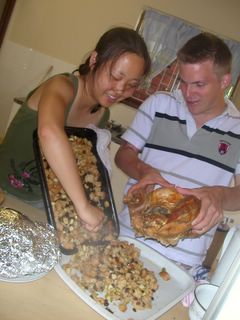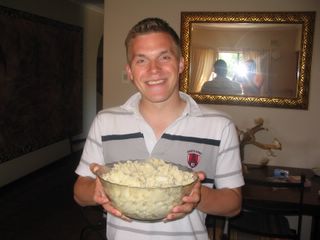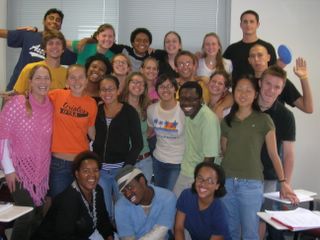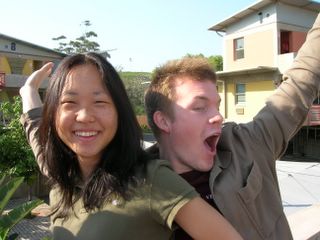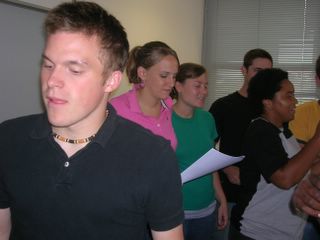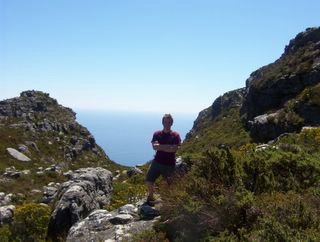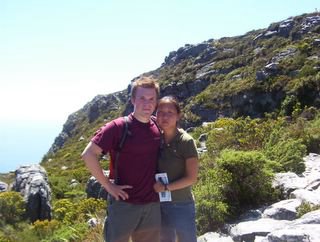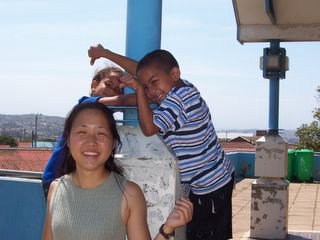What Does “Development” Mean? We descended into the airport over a neighborhood of leafy cul-de-sacs dotted with white, two-story houses where station wagons scurried like ants through a maze of streets, houses, parks and small businesses. Johannesburg’s generic urban skyline in the distance, I wondered to myself whether this could be the “Dalpark Six” neighborhood that I had read about, a middle-class suburb where people of every race background lived as neighbors, the “new South Africa.”
Fast forward. I’m standing in a veritable dump, crumpled, soiled paper and packaging scattered across a muddy embankment where the heavier plastic bundles and a broken mirror have slid to the bottom in a growing pile. At the top of the embankment are the same colors and textures that litter the slope, but here they’re insulating, decorating, and patching the walls and roofs of shacks where whole families live.
These two scenes might as well be just a few blocks apart. In the first, a neighborhood that could be anywhere in the “developed” world exists as the other, a “squatter camp” filled the thousands whom the city hasn’t made room for, subsists. For me to describe the stark, side-by-side contrast between wealth and poverty that shows itself across South Africa as a revelation would be dishonest, for I knew that it would be this way. To call it “shocking” or “jarring,” the words that often modify this “contrast,” would be naïve. On the development path that South Africa and many countries like it have taken, the leaky shacks on the one side of this path and the insulated comfort on the other have come to feel inevitable by sheer repetition: Kuala Lumpur, Shanghai, Buenos Aires, even Houston. Does “development” require both, dual turbines spinning in a fateful dialectic?
But I knew and still know that it doesn’t have to be this way. When I thought of development I thought of Seoul, of Tallin, of Bangalore and of Dublin. In each of these places, to varying degrees, “the masses” had moved from subsistence, even devastation, into a condition of access – to jobs, wages, education, health care, and to choices about their livelihoods and their futures. With this sort of development, villages that had perished from easily prevented diseases could now live free from this fear; women who had spent three hours of their day fetching water could work as seamstresses and save their own wages (if they chose to); children whose parents had been illiterate could read out loud. And when they came of age, I thought that development meant that these children could now choose from a range of professions, pursuing the one that they found most meaningful. So I landed in Johannesburg thinking of development as the provision of material security to all who chose to take it, and then of the expansion of educational, professional, and social opportunity within a framework of political and human rights. And as far as is possible, I understood proper development as incorporating the voices and hopes of the communities where it takes place.
I still believe that development means these things, or at least that it should. And while I still believe that development is about choices, I’ve seen how the expansion of choice for some will often—if not always—limit the choices of others. The priority of one voice over another might be decided on who has the lighter skin, the bigger wallet or the bigger gun—and it’s not clear that the wealth/financial dynamic has changed fundamentally here since 1994. For the poor, the rural, the undereducated—those most excluded and marginalized—the least development has occurred for the people who need it most desperately. So while my conception of the goals of development has only been nuanced, not fundamentally changed, I’ve come to bitter terms with the resources, priorities and indifferences that constrain or undermine the means by which this vision would be realized. Neither do I know who should or who can bring those goals of development about—who the “agents” should be. My heart has been broken by the things that people do in the name of “development,” and I’ve arrived at a deep skepticism of anyone who tries to claim the legitimacy that the word confers. I hope that this skepticism isn’t self-righteous—when it comes to understanding how development should work in practice, the one I’m most unsure of is myself.
In an early lecture introducing her idea of development to us, Professor Betty Mubangizi gave us an exercise with two sketches of a village, the first before a large Coca-Cola plant had been established and the second afterwards. In the second, the villagers had been relocated next to a large dam that was to generate power, their farming land was now used for cash crops, and their shoreline was now a freight-shipping port. Professor Mubangizi’s directions were probably too vague, but what resulted was no less illustrative. Asked to infer what was different between the pictures, I said “where before they had to farm, now they can work at the port, in the factory, or they could farm the cash crops” and “with the port, they have access to export markets and can develop a comparative advantage.” Asked about the downsides, I thought that perhaps this development might erode their traditional way of life, but on the whole it would bring good things. We soon saw that Professor Mubangizi had intended to illustrate something much different: she said that this was a village in rural South Africa during apartheid, and that the Coca-Cola factory and the agri-business had taken the land with the government’s assistance and relocated the villagers to land which was neither fertile nor desirable (because it was underneath a large dam). Her villagers were not given employment at the factory, they could only pick cotton on the new plantation that the government had given a white man. In short, these villagers had been categorically disempowered with no choice of their own; their opportunities had diminished and their livelihood and traditional culture have been corrupted.
The difference between her description and mine didn’t mark my own ignorance, for she had given such vague directions. Rather, it showed the difference between how development should occur (ideally) and how the power structures of unjust government coupled with the profit-interests of big-businesses have rendered it in this country. What Coke, aided by the apartheid state, might justify with the language of economic growth and opportunity hasn’t just “eroded” people’s way of life, it has systematically corrupted it and reduced their livelihoods to borderline subsistence. In these cases, we no longer have the luxury of abstract questions of what development should mean. Because everything that was has been destroyed, the question must instead be: “What do we do now?”
A walk around Amacambini, the rural community where we spent a week last month, ends with the same question. Here too are a people whose control of their way of life and their land had been wrested from them. They with their hopes and families have been dumped onto overcrowded plots of semi-arid land away from everything that they want and need. Because this land could not support them, the men had to travel to the cities to work, straining their marriages and the very cohesion of their communities. This condition had not been about choices – it had been a process of coercive dispossession and economic necessity. Ten years after the official end of the apartheid condition, the community still bears apartheid’s weight in under-education and underdevelopment. If anything, the underdevelopment of Amacambini only enforced my understanding what development should be, by their contrast. The villagers here needed all of the things I had described before – an improvement in their material security, in information about health and disease, and in the educations available to their children – if only to redress that which had put them there in the first place. Indeed, these were exactly the needs that my acquaintances there expressed: development could not be more “community-driven” or commonly agreed upon than it sounded like water, schools and feeding-schemes would be here.
Reading this far, you might protest that I am confusing the policies of the apartheid state with schemes for development that have simply gone astray, and I do realize that these are different in magnitude and in intent. Nonetheless, it was frightening to read the speeches of the apartheid’s architects, outlining the importance of “the natives” maintaining their traditional way of life on their traditional land, “developing along their own path”. Those calls for “separate development” do not always sound so different from today’s calls for decentralized development and “rural skills for rural peoples”. My point is not that the “developmental” goals of the apartheid state and the present government are the same; a closer look will show you that they are not. Instead, the similarity in their rhetoric goes to show that you must pay attention to language, and realize that sometimes it might not mean anything at all.
The language of the students we met on our visit to the University of Zululand and their classes we observed made me further skeptical that anything will really change for places like Amacambini. These students were there to study development, the next generation of government bureaucrats, and they were wonderful people. But from every lecture and conversation that I had there, it did not seem like they were being equipped to think critically about the discourse on development here; instead they were fed and could rehash the language of the government, but nothing much more. They threw around words like “infrastructure,” knowing that there ought to be roads and power plants, but not knowing how these could be designed, financed or built. A few of them came from the rural areas, but most of them were from the cities and said that they (correctly) saw the best jobs as being in government, and thus pursued developmental studies. To extend the comparison from before, the apartheid state’s so-called “development” policies were designed and controlled centrally by a small group of bureaucrats who were removed from those areas, not unlike the group of students I saw emerging there or the present group of consultancies and government agencies that control current policy. Not only did the students talk of “infrastructure” with severely limited understanding of what this meant, they didn’t see a problem in the fact that they, not a little bit out of touch with rural life, would be the ones bringing this about. What was most frightening, though, was that all they talked about was infrastructure, as if this would solve the problems of Amacambini. It sounded like the same shortcomings of government policy, parroted by its next generation of employees.
What has been most heartbreaking to me are the places where infrastructure doesn’t even enter the language of those, present or future, with control. To the Kennedy Road community, an “informal settlement,” any infrastructure would feel miraculous, as the state has provided them just four water-taps for a 6,000 people and even fewer toilets. As the Durban municipal government bails out theme parks and finances nightclubs and clears land for casinos, all in the name of development, they send empty promises and bulldozers to Kennedy Road, hoping that the people will take their shacks and families somewhere else where they can’t be seen. In this case, it’s clear that the priorities of the council are misplaced, probably in the pockets of the companies building these “attractions,” but that doesn’t change anything for Kennedy Road until they win over people’s sympathy. They must convince the council that building another toilet is feasible—that is obvious—but also that they deserve it. And herein lies the most awful fallout of the end of apartheid: in the popular narrative, for Kennedy Road, Amacambini, and every place like them, until 1994 and perhaps for a few years afterwards, their plight was the result of state oppression. Now, though little has really changed, their present condition is on their own hands. And the narrative that paints them this way is the same one that puts development in the hands—and on the shoulders—of individual communities. But if all this means development should neither be centralized (in the hands of out-of-touch bureaucrats) or decentralized (leaving disempowered communities to languish) then how can we bring it about?
To reside at the point where I find myself, knowing what development should result in, but not knowing who should bring it about or how, is deeply frustrating. Until we figure out how to do development, communities will languish in poverty and families will buckle under the pressures of unemployment and disease. But wait! For me to suppose that people ought to wait for me to tell them what development, of course, would be the most presumptuous claim of all. The fact that development cannot and is not waiting for me to work out all of confusion is comforting and exciting. The visit last week to the Xhosa women near Gugulethu, saving together and building houses one-by-one, was a strong case for people’s ability to develop their communities on their own. These women had taken matters into their own hands, and the results stood all around us—150 homes they had built themselves in the past 10 years. And people are coming together on Kennedy Road, too. They had more than anywhere else the “democratic mores” that de Tocqueville praises, electing leaders and holding weekly meetings. Their power with the municipal council is growing stronger as the community members come together to articulate their common concerns, often by way of 5000-strong, peaceful marches in protest. In the cooperative, the women are making the most of the grants that the government gives them to improve their own conditions; at Kennedy Road, the residents are demanding from the government the environment to empower themselves. In some places, the people get on in spite of the government and development community’s biases and delays. This is not a prescription for policy—“laissez faire development,” or something—but a testimony to people’s resilience, a second refrain of the struggle that ended apartheid.
So where do I fit in? For now, I’ve put some of my NGO-management aspirations on the backburner, wanting instead to take more time to really understand the development problems that communities face, and wanting to learn from those South Africans who are providing the leadership that NGOs sometimes co-opt. What I want to do most immediately is with my independent study project: I want to contribute to the popular narrative on what development is and who it should be for. I want to tell the story of Kennedy Road, to highlight their plight and with it to highlight their resilience and wonder, challenging the municipality’s characterizations of them as dirty and stupid. In this new narrative, I want mostly to tell the truth – to stop playing the games that real estate developers and apartheid functionaries played with the language of development, perhaps to begin its reclamation. As with my own role in and understanding of development, I don’t know where this independent study project narrative will end up, but I’m looking forward to arriving there (if “there” even exists).
 church songs. Also, if you're interested in being part of our gospel ensemble, shoot me a comment or an email ASAP.
church songs. Also, if you're interested in being part of our gospel ensemble, shoot me a comment or an email ASAP.

